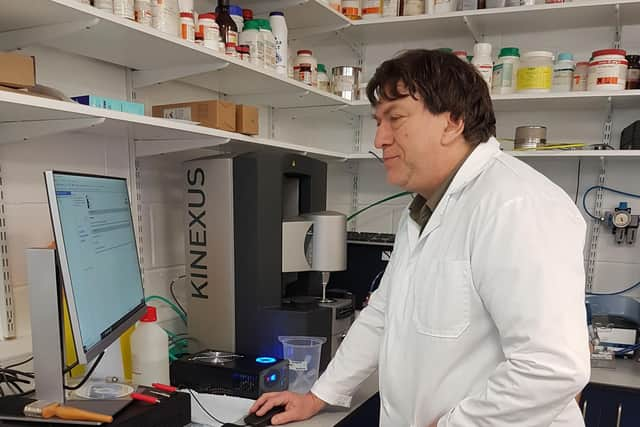Heriot-Watt Uni team hits upon marine substitutes for food and beauty products
Experts at Edinburgh’s Heriot-Watt University said the potential for the sustainable additives was huge but admitted that persuading the food industry to adopt them would be a challenge. Consumers could also face higher prices as a result.
The market demand for surfactants and emulsifiers is currently met with synthetic, mainly petroleum-based chemical products. These are commonly non-biodegradable and can be toxic.
Advertisement
Hide AdAdvertisement
Hide AdSurfactants are used to reduce surface tension, as in detergents and foaming agents, while emulsifiers can be added to stabilise oil in processed foods or cosmetic creams.


Led by demand from industry manufacturers keen to find more sustainable sources, a consortium fronted by Heriot-Watt University has now unveiled “promising” alternatives found in marine microorganisms.
Tony Gutierrez from Heriot-Watt University provided the large bacterial collection used for the screening and discovery of new surfactants and emulsifiers.
He said: “The project was designed to improve the sustainability and quality of a wide range of consumer products by using natural ingredients produced by marine microbes.
“From 500 initial strains, the research team worked closely with industry partners to scale up production of two strains with very positive feedback from the end users on functionality.
“This indicates there is clear potential for these strains to be useful in commercial applications. However, investment will be required to ensure the cost efficacy of production.
“In the future, this could have huge potential impact for industry and for consumers themselves as these strains are derived from a sustainable and non-pathogenic marine bacterial source. They are of biogenic origin so have a much better environmental profile compared to petroleum-based surfactants which are currently used in industrial applications.”
Professor Stephen Euston, also from the Heriot-Watt team, said: “The applications for this research are widespread.
Advertisement
Hide AdAdvertisement
Hide Ad“However, ensuring this is commercially viable for the food industry will be the most challenging next step. Consumers won’t spend a high premium on everyday food items and that has to be factored into the race to address sustainability.
“The research has the potential to positively impact the food industry. We are working with Marlow foods to help them remove egg whites from their range, thus opening up more of their product range to those following a vegan diet.
“The current egg white replacements on the market are not suitable for all products. Our new strain isn’t affected by some of the issues encountered with other protein sources and is suitable for vegans as it is not animal derived.
“Working so closely with industry and our collaborative universities allowed the consortium to develop promising naturally derived surfactants from discovery, through to proof of concept, industrial production and application in product formulations by the commercial end users. This approach to research is both exciting and novel.”
The Marisurf consortium included 12 partners, with Heriot-Watt University among the five academic institutions. The four industrial companies were Bio Base Europe Pilot Plan, EcTechSystens, Nova-Institut fur politische und okologische innovation, and Acondicionamiento Tarrasense Association. The three end-user firms were Apivita, Marlow Foods and Nanoimmunotech.
A message from the Editor:
Thank you for reading this article. We’re more reliant on your support than ever as the shift in consumer habits brought about by coronavirus impacts our advertisers. If you haven’t already, please consider supporting our trusted, fact-checked journalism by taking out a digital subscription: www.scotsman.com/subscriptions
Comments
Want to join the conversation? Please or to comment on this article.